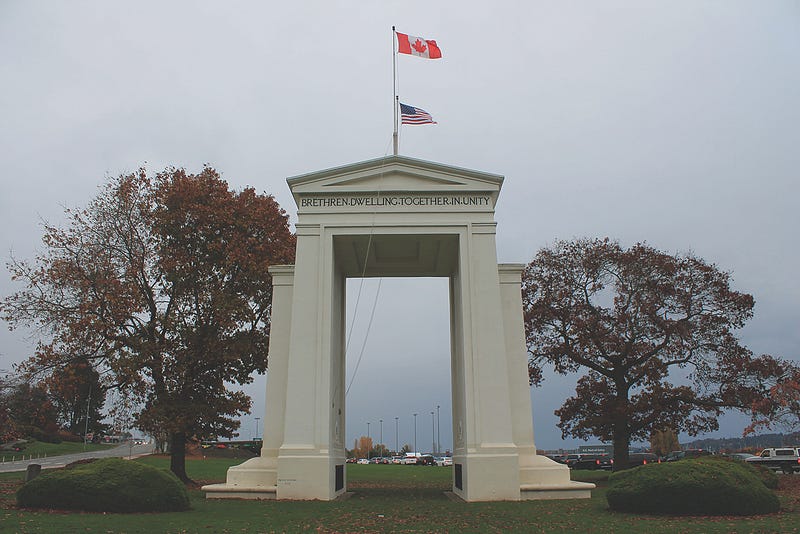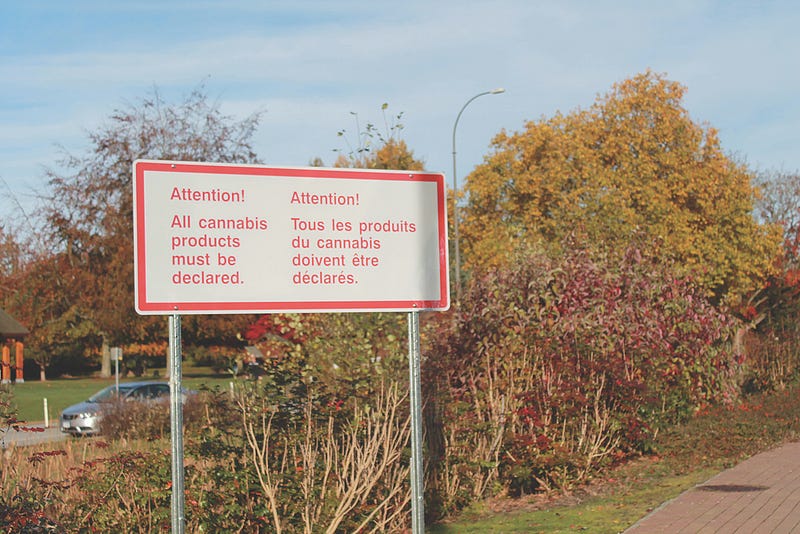Crossing the line
Recent changes in marijuana policy on both sides of the Canadian-U.S. Border has already led to confusion for Canadians and Americans alike
Story by GWEN ROLEY
The U.S.-Canadian crossing between Blaine, Washington and Surrey, British Columbia is marked by the Peace Arch monument which promises friendship and a perpetually open border. Americans and Canadians from the surrounding communities casually cross the border on a regular basis, but in the last few months, security has become tighter. Some vehicles are stopped and searched before even reaching the line for passport checks. After the passport checkpoint, border security pulls aside more vehicles for secondary screenings.
These changes in border procedure can be explained by a new sign, displayed so every traveller can read it following the sentiments of fraternity found on the Peace Arch: “Attention! All cannabis products must be declared.”
Recreational marijuana was nationally legalized in Canada on Oct. 17, 2018, after the Canadian Senate passed “The Cannabis Act” in June. However, marijuana is still federally illegal in the United States. This means Canadians crossing the border from British Columbia into Washington, where recreational marijuana has been legal since 2014, could be banned from the U.S. for life for admitting to their participation in the legal marijuana industry. Canadians who are found inadmissible can appeal their status with a waiver, which costs $580 (U.S.) and takes four to six months to process.

“With Canada legalizing federally, that creates a whole layer of confusion,” said Laurie Trautman, director of the Border Policy Research Institute at Western Washington University. “The potential for consequences crossing back and forth are pretty severe.”
The BPRI studies Canadian-American relations in the Pacific Northwest. Their studies on the effects of legalization predict that border crossings by Canadians may drop for fear of being banned, and Americans will be wanting to avoid the longer waits resulting from stricter border security. U.S. Customs and Border Protection has stated that they will continue to enforce federal drug laws and decide when to screen travelers on a case-by-case basis.
British Columbia and the Pacific Northwest. have always shared similarities in geography, culture and economics. Many businesses in Whatcom County and British Columbia are built around serving cross-border customers, but now there is a fear that tightening the border will discourage this form of international commerce.
Canna-business
Trautman, along with Blaine immigration lawyer Len Saunders, has predicted economic implications for the U.S. once marijuana is legalized in Canada.
“[Whatcom County businesses] rely upon Canadians for keeping businesses going, because they cater to Canadian clients,” Saunders said.
The cannabis industry is not exempt from this international economic phenomenon. Aaron Nelson, Director of Actualization at growing Bellingham marijuana business 2020 Solutions, estimates between 12 and 15 percent of his company’s business comes from Canadian “pot tourists.”
“I actually think that the Canadian legalization will lead to an increase in Canadians purchasing and consuming here because they’re not going to bring it across the border with them,” Nelson said. “But as it’s more and more accepted in Canada, it’ll be just a normal thing to do on vacation or won’t be as taboo as it currently is in some social circles.”
So far, it’s hard to tell what the long-term effects of this policy change will be. Since Canadian legalization, only one recreational store has opened in B.C. in Kamloops, about three hours from the border. There are medical marijuana shops in B.C. which will be making the transition into the recreational market, but many have closed down as they make their way through the bureaucratic process of opening a legal cannabis store. One exception is Weeds Glass and Gifts in downtown Vancouver, owned by Don Briere.

Weeds, which has 17 retail stores across Canada, has been open for over five years and existed within a legal grey area where they were licensed to operate while recreational cannabis was still illegal. Like 2020 Solutions, Weeds has benefitted from a market of international tourism.
“Many people have come from all over the world,” Briere said. “They’re amazed, impressed, dazzled.”
There are Americans and Canadians in the marijuana business who are optimistic about the future of their industry. Nelson says after the Canadian government has blazed this path forward, American federal legalization could be possible, but it’s more dependent on the demographics of elected officials. Since this remains out of their control, many businesses focus on educating people on cannabis laws and benefits.
“We see ourselves as an asset to society because a lot of people use cannabis as an exit drug to get off of opioids,” Briere said. “So we do help people and we are beneficial to society and people really like us and support us.”
Nelson, despite his own disagreement with American marijuana regulation, makes a point of eliminating confusion for customers when it comes to the substance’s legal status.
“If they mentioned they’re travelling, we tell them it’s not legal to leave the state of Washington with any of the products they purchased, even to neighboring states that do have legalized cannabis such as Oregon,” Nelson said. “You’re still not permitted to cross the state lines with cannabis because it’s illegal on the federal level.”
Comprehending Cannabis in Cascadia
Trautman and the BPRI took great pains to predict the effect legalizing cannabis in Canada would have on the Pacific Northwest. Her report “Cannabis in Cascadia: Impacts of Legalization in the Region” was completed just days before Canadian legalization was passed.
Since legalization has reached Canada, the West Coast of North America is now the only contiguous region in the world where marijuana is legal. For this reason, many residents of the Cascadia region accept marijuana’s legality as universal.
“I think for a lot of people living in Washington state, especially younger people, there’s kind of a general sense that marijuana is just legal,” Trautman said. “People see stores everywhere so I’m just not sure how much knowledge there is that it’s really federally illegal.”

In the past, the federal governments in the U.S. and Canada have both taken a hands-off approach to marijuana. In the U.S., the allowance of legal medical and, more recently, recreational marijuana has been left up to the states. Medically legal marijuana must be prescribed by a doctor, but in legal recreational markets anyone over the age limit of 21 years old can buy and consume cannabis from a vendor.
By 2000, California, Washington and Oregon had all legalized medical marijuana and between 2014 and 2018 Colorado, Washington, Oregon, Alaska, Nevada, California and Massachusetts all opened legal recreational markets. As of 2018, Maine, Vermont, Michigan and Washington, D.C. all allow the possession and use of marijuana but do not have legal retail markets.
In 2001, Canada legalized medical sale of marijuana. Since then, Canadian law enforcement has paid less and less attention to marijuana possession. Shops with a quasi-legal status selling “B.C. Bud” began to pop up in British Columbia.
“All the provinces one by one said ‘we’re going to go the federal route and legalize it and get involved with the sale and distribution.’” Saunders said. “In the U.S. it went the other way around. It’s the states that legalized this and so that is where you have the inconsistency.”
The legal age of consumption of marijuana in most of the provinces is 19 years old, the exceptions being Alberta and Quebec, where it is 18.
A survey conducted by Trautman of students at Western Washington University found 83.3 percent of respondents knew Canada was legalizing cannabis. However, 38 percent of respondents thought crossing the border into B.C. or Washington with marijuana would be legal once Canada legalized recreational cannabis, but 56 percent of respondents knew crossing the border with marijuana would remain illegal.
Since some people at Western have either dual or full Canadian citizenship, there were discrepancies in Trautman’s results. She said many people thought crossing the border with cannabis would be legal for Canadians. This is not the case, she said, as the U.S. still considers marijuana an illegal drug and will ban any non-American who has a marijuana conviction or admits to consuming cannabis.
Banned for life
From his position in Blaine, right across the border from Canada, Saunders sees a lot of cases of Canadians trying to be readmitted to the U.S. after admitting to cannabis use. These cases were not uncommon before Washington legalization, but in the past four years they have spiked, Saunders said.
“It started going from one or two cases a month to literally one or two cases a week,” Saunders said. “Sometimes it verges on one or two a day.”
Saunders, a Canadian-American dual citizen himself, said when he first opened his practice in the border town he had anticipated working on cases involving citizenship and marriages between people of different nationalities. However, circumstance has pushed him toward making marijuana inadmissibility cases his specialty.
“You have to remember, I’m just one little attorney,” Saunders said. “I’m not in downtown Vancouver at some office in the Columbia Building, I’m in Blaine.”
Most of Saunders’ clients call him from over the border just after being denied entry. He coordinates with them on how they will be filing their waiver of inadmissibility, where fees and wait times can vary from case to case. Saunders said he has filed upwards of 3,000 of these waivers and all of them will have to be renewed either when the underlying visa expires or after five years.
Saunders also deals with clients who participate in legal marijuana industries in both the U.S. and Canada. Many cannabis companies in the U.S. rely on angel investors from Canada to provide capital for new businesses since banks won’t give them a loan to open a marijuana store or manufacturing site. He recently had to process a waiver for businessmen in Surrey who manufacture agricultural trimming machines.
“Guess what kind of plants it trims,” Saunders joked sarcastically.
Saunders pointed out that many of his clients are ordinary people who admit to using marijuana. They include family vacationers, international employees who work in the U.S. and one Olympian snowboarder, Ross Rebagliati, who admitted to smoking pot on The Jay Leno Show in 1998. The next time he tried to go to the U.S. he was barred.
“It’s life-changing. If [a U.S. citizen is] denied entry to Canada it’s not the end the world,” Saunders said. “If Canadians get denied entry to this country it’s a big issue.”
In March of 2018, Saunders traveled to Ottawa to testify to the Canadian Senate about this issue and brought up the example of Rebagliati’s case. He also explained under this U.S. policy, once Canadian Prime Minister Justin Trudeau leaves office and is no longer travelling on a diplomatic passport, he too would be deemed inadmissible due to his public admission to having used marijuana in the past. Saunders said the Senate was shocked by these facts.
“For me to get clients waivers, when marijuana is legal in Washington state and everybody knows it, and it’s legal in Canada, is a colossal waste of time,” Saunders said.
The Peace Arch crossing on I-5 in the U.S. and Highway 99 in Canada, sitting between the major cities of Vancouver, B.C. and Seattle, Washington, is the busiest U.S.-Canada border crossing west of Detroit. Now that marijuana is legal in Canada, this crossing system is the busiest entry point with legal cannabis markets on both sides of the border.